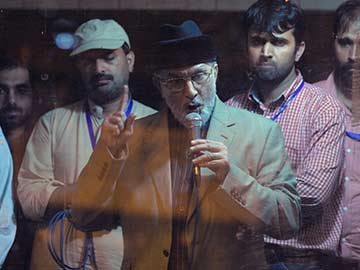
Tahir-ul-Qadri, the cleric who is leading protests along with Imran Khan in Islamabad, asked protesters to prevent law-makers present in parliament today from leaving the premises till Prime Minister Nawaz Sharif resigns. Mr Sharif has, however, left Parliament House and reached his residence.
Following are the latest updates:
Pakistan's Supreme Court has ordered Imran Khan and Tahir ul-Qadri to appear in court tomorrow, in response to a petition filed against them over their protests, Reuters has reported.
About 30,000 protesters are picketing the Red Zone in capital Islamabad that houses key buildings including Parliament, the prime minister's house and numerous Western embassies. They reached Parliament House early on Wednesday morning and are blockading the building.
Imran Khan has threatened to storm the Prime Minister's residence next if Mr Sharif does not resign by this evening. Mr Qadri said, "Till the time he doesn't resign, nobody should be allowed to go in or come out. Not even a mosquito."
Imran Khan's Pakistan Tehreek-e-Insaf or PTI has also begun a protest demanding Mr Sharif's resignation in Karachi. Mr Qadri and he claim that last year's general election - in which Nawaz Sharif's Pakistan Muslim League-N had won a landslide victory - was rigged. The election was rated as free and credible by international observers.
Mr Sharif has refused to step down. In a move to underscore the Army's support to his government, he has deployed 700 soldiers to guard Islamabad's Red Zone.
A three-member bench of the Supreme Court of Pakistan, headed by Chief Justice Nasir-ul-Mulk, has begun an investigation into Mr Khan's allegations of rigging in last year's national elections. The probe was announced by PM Nawaz Sharif last week. Many saw it as an attempt to preempt the opposition protests.
The military has warned the protesters to keep out of government buildings. The protesters say they will stage sit-ins before Parliament House till Mr Sharif resigns. They entered the Red Zone without facing any resistance and were there overnight. The situation is calm but Islamabad is on high alert.
Despite fears of violence, there have been no major clashes yet. The government had pledged restraint and the soldiers turned spectators as women and children, who are part of the protest, marched on. Both Mr Khan and Mr Qadri too asked the protesters to be peaceful. "We will stage such a big crowd that people will forget Tahrir Square," Mr Khan told his followers.
Nuclear-armed Pakistan has experienced three military coups and Mr Khan's protest raises fears of the army stepping in. Thus, opposition parties had shunned Mr Khan's call to unseat the government and urged him to come to the negotiating table.
The International community has signaled its displeasure. Britain, one of Pakistan's leading partners and a major aid donor, has urged the two sides to find a democratic solution to the crisis. The European Union also voiced support for democracy in Pakistan - and linked it to a highly prized trade deal.

